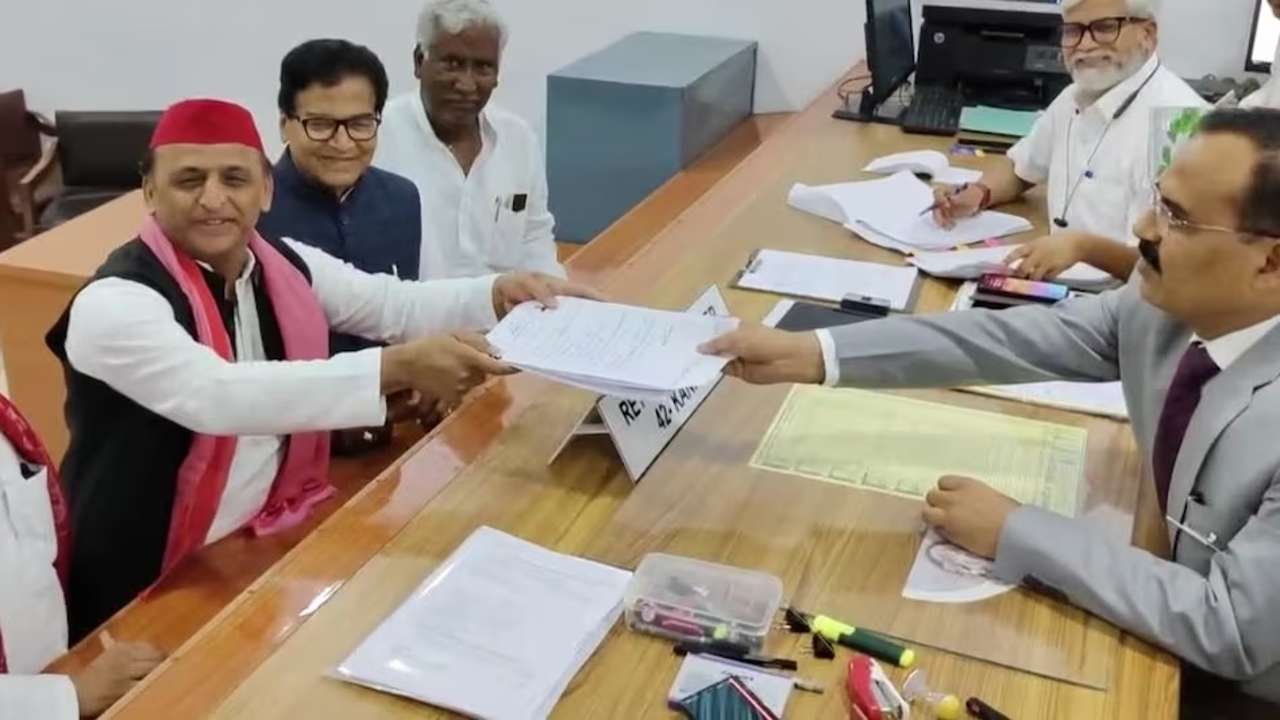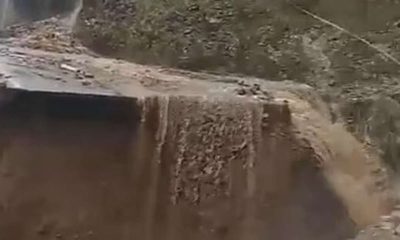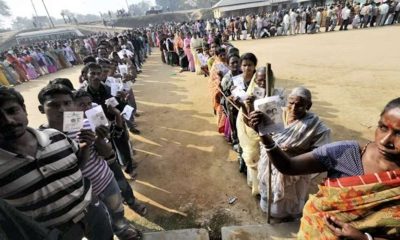India News
Salman Khan gets bail in blackbuck poaching case after two nights in jail

Bollywood star Salman Khan was granted bail by a court in Jodhpur district and sessions court at 3 pm on Saturday, April 7.
Salman had spent the last two nights in Jodhpur Central Jail after he was convicted in a 20-year-old blackbuck poaching case and sentenced to five years’ jail and fined Rs.10,000 on Thursday. He was sent to Jodhpur Central Jail and was given the tag of “Qaidi no 106”. This was the actor’s fourth stint in this prison. He has spent a total of 18 days in the jail in 1998, 2006 and 2007.
The hearing of his bail plea started on Friday and Judge Ravindra Kumar Joshi, who began hearing his bail request this morning for the second day, announced his decision just after lunch.
Arguing for bail, defence counsel Mahesh Bora said there were various loopholes in the investigation and argued that no investigation in any of the cases of poaching proved that Salman used firearms. The defendants had filed a 51-page bail application saying that the witnesses are not reliable and cannot be relied upon. His bail application was barely opposed by the prosecution.
The prosecution talked about the credibility of the witnesses and hinged the case on the post-mortem report which said that the blackbucks had gunshot wounds. However, Salman’s lawyers argued that only the bones of the animals were sent for evaluation when their skins, as crucial, weren’t.
Bollywood star Salman Khan got bail with a rider. He can’t travel without prior permission of the court and will have to deposit his passport before the court.
On Thursday, Judge Dev Kumar Khatri had convicted Salman Khan, holding him guilty of killing two blackbucks 20 years ago in Kankani village, near Jodhpur in Rajasthan, during the shooting of a multi-starrer, “Hum Saath Saath Hain”. His co-actors Saif Ali Khan, Tabu, Neelam Kothari and Sonal Bendre, who were in the SUV that Salman was driving during their alleged late night hunting outing, were, however, acquitted by the Jodhpur sessions court.
The case against him was brought by members of the Bishnoi community, who revere antelopes. The community has pursued the case for almost two decades and welcomed his conviction.
Judge Joshi, who is in the middle of the annual reshuffle of judges in Rajasthan, had, on Friday, put off the hearing by a day as he wanted to go through the entire case record before making a decision. He will be replaced by Chandra Kumar Songara, district and sessions judge of Bhilwara within the next week.
The blackbuck, an endangered species, is protected under Schedule 1 of the Indian Wildlife Act and the punishment for hunting blackbuck can be up to six years. Salman Khan has also been accused of killing two chinkaras and a blackbuck in September 1998. In all, three cases of poaching and one under the Arms Act were registered against Salman Khan in 1998.
In July 2016, the Rajasthan High Court acquitted Salman Khan in the chinkara poaching cases. A year later, the Jodhpur court acquitted him in the Arms Case, where he was accused of possessing and using weapons with an expired licence during the hunt for the endangered chinkaras and blackbucks.
2024 Lok Sabha Elections
Bollywood actor Neha Sharma campaigns for her father Ajit Sharma in Bhagalpur, Bihar
The Bollywood actor posted a video on her Instagram handle which showed her journey through various districts of Bihar, including Kishanganj, Banka, Purnea and Katihar. She was dressed in a traditional salwar kameez and was seen greeting and encouraging the public to cast their votes.

Bollywood actor Neha Sharma’s recent participation in a roadshow in Bihar has taken the internet by storm. Sharma, known for her roles in films like Tum Bin 2 and Crook, was seen supporting her father, Ajit Sharma, who is contesting from Bhagalpur Lok Sabha seat on a Congress ticket. The roadshow came amid speculations that the actor might enter politics. But, it is now clear that she was just campaigning for her father.

The Bollywood actor posted a video on her Instagram handle which showed her journey through various districts of Bihar, including Kishanganj, Banka, Purnea and Katihar. She was dressed in a traditional salwar kameez and was seen greeting and encouraging the public to cast their votes.
The actor received a warm reception and love from a large crowd in Pirpainti and Kahalgaon during her roadshow. She wrote on Instagram that it is said when someone gives one a place in their heart, then they live there forever. She said her heart is full of all the love and support she was receiving from the people. She thanked the people for the warm welcome she got in Pirpainti and Kahalgaon. Aapka pyar sar ankhon par.
Another video, circulating on social media showed the actor actively participating in her father’s election campaign in Bhagalpur. The election to the Bhagalpur Lok Sabha seat is set to take place in the 2nd phase on April 26. Ajit Sharma is representing the Congress and is up against JDU’s Ajay Kumar Mandal in this seat.
Earlier, there had been rumours and speculations that Neha Sharma might join politics. But many reports have clarified that she is not making her political debut yet. The Bollywood actor had been offered the opportunity to join politics by her father Ajjit Sharma but she is currently focusing on her acting career.
Education
Farmer’s son Nilkrishna Gajare Nirmalkumar from Maharashtra scores 100 NTA score in IIT-JEE Mains 2024
Nilkrishna Gajare’s father is a farmer and had to discontinue his own education after Class 12 as he faced financial difficulties. Gajare faced financial challenges growing up. However, his unwavering dedication and strategic approach to preparation set him apart from the crowd.

Nilkrishna Gajare, who hails from Maharashtra’s Washim, achieved an extraordinary feat by securing a perfect score of 100 in the JEE Main 2024 examination. His journey from humble beginnings to the pinnacle of success is a source of inspiration for many people.
Nilkrishna Gajare’s father is a farmer and had to discontinue his own education after Class 12 as he faced financial difficulties. Gajare faced financial challenges growing up. However, his unwavering dedication and strategic approach to preparation set him apart from the crowd, which resulted in his remarkable achievement of emerging as topper of one of India’s toughest Engineering entrance exams.
Nilkrishna Gajare had a strategic plan that helped him succeed in IIT-JEE 2024. According to Nilkrishna persistence is important and one should never stop trying until they understand a topic. He said being curious and asking questions are important traits of a good student. He said one should not be ashamed of asking questions.
Nilkrishna spent around 10-15 hours every day studying on his own for the JEE Main exam. He mentioned that he used his class notes for Physics and Physical Chemistry. For organic chemistry and inorganic chemistry, he relied on both notes and practice questions.
As for Mathematics, he believed that practicing regularly was the most important thing for him. Other interests of Nilkrishna include archery. He has participated at both state and national levels, and he finds joy in the sport. He said archery helps him understand the importance of focusing his attention on his goals. Nilkrishna likes watching movies and said they are a great source of enjoyment and relaxation.
He likes to watch a movie after exams and occasionally treats himself to one each week too. Gajare aims to keep up the pace for the JEE-Advanced exam and hopes to get into the IITs. He said he wants to secure admission in IIT-Bombay in the computer science branch.
2024 Lok Sabha Elections
Lok Sabha elections: Samajwadi Party chief Akhilesh Yadav files nomination from Kannauj
The Samajwadi Party has announced Akhilesh Yadav as its official candidate for the Kannauj Lok Sabha seat today

Samajwadi Party (SP) chief Akhilesh Yadav, submitted his nomination for the Kannauj Lok Sabha constituency ahead of tomorrow’s second round of voting. In front of Ram Gopal Yadav and other party leaders, the chief of the SP, who had previously contested the seat in 2000, 2004 and 2009, submitted the nomination.
Speaking with media, Ram Gopal Yadav said that SP would win the seat by a huge margin. The BJP candidate might lose his deposit in the seat, he said.
The Samajwadi Party has completely reversed its earlier plan to field former Mainpuri MP Tej Pratap Singh Yadav as their candidate, which is a significant political development.
Earlier, Akhilesh Yadav told reporters, people will find out when the nomination takes place, in reference to the speculations that he will contest for the seat. The historic victory of Kannauj is the subject of inquiry.
The former chief minister continued, the people have decided that the India bloc is coming as the future and the BJP will be history in this election.
Notably, elections for the Kannauj seat are scheduled for May 13, which would intensify the political drama that is now playing out in Uttar Pradesh. Previously regarded as the Samajwadi Party’s stronghold, the seat was lost by the party in the 2019 election when Subrat Pathak of the BJP won with a resounding victory.
The candidates competing for the following Uttar Pradesh seats will find out their destiny in the second round of voting, which is scheduled for tomorrow, Amroha, Meerut, Mathura, Baghpat, Aligarh, Ghaziabad, Gautam Buddh Nagar, and Bulandshahar.
Notably, two Bollywood celebrities running as BJP candidates in the second round are Hema Malini from Mathura and Arun Govil from Meerut. There are 91 contestants from UP competing in the second phase.
The seats in Gautam Buddha Nagar and Mathura are up for grabs, with a maximum of 15 applicants per seat. In Bulandshahr, six candidates are vying for the presidency. There are twelve contenders running in Amroha, eight in Meerut, seven in Baghpat, and fourteen in Ghaziabad and Aligarh.
1,67,77,198 votes will decide these candidates’ fates.
-

 India News7 hours ago
India News7 hours agoLandslide hits Arunachal Pradesh, highway linking Indo-China border affected
-

 Education5 hours ago
Education5 hours agoFarmer’s son Nilkrishna Gajare Nirmalkumar from Maharashtra scores 100 NTA score in IIT-JEE Mains 2024
-

 Entertainment7 hours ago
Entertainment7 hours agoBollywood stars Salman Khan, Alia Bhatt, Rekha, Sonakshi Sinha, Aditi Rao Hydari attend Sanjay Leela Bhansali’s Heeramandi premiere
-

 India News8 hours ago
India News8 hours agoTamannaah Bhatia summoned in illegal IPL streaming app case, to appear before cyber cell on April 29
-

 2024 Lok Sabha Elections7 hours ago
2024 Lok Sabha Elections7 hours agoBihar: Election Commission extends voting timings for 4 Lok Sabha seats due to heatwave
-

 Cricket news8 hours ago
Cricket news8 hours agoIPL 2024: Rishabh Pant, Axar Patel score half centuries as Delhi Capitals beat Gujarat Titans by 4 runs
-

 Cricket news46 mins ago
Cricket news46 mins agoTelugu superstar Mahesh Babu meets SRH captain Pat Cummins, says it is an absolute honour
-

 2024 Lok Sabha Elections6 hours ago
2024 Lok Sabha Elections6 hours agoLok Sabha elections: Samajwadi Party chief Akhilesh Yadav files nomination from Kannauj

















